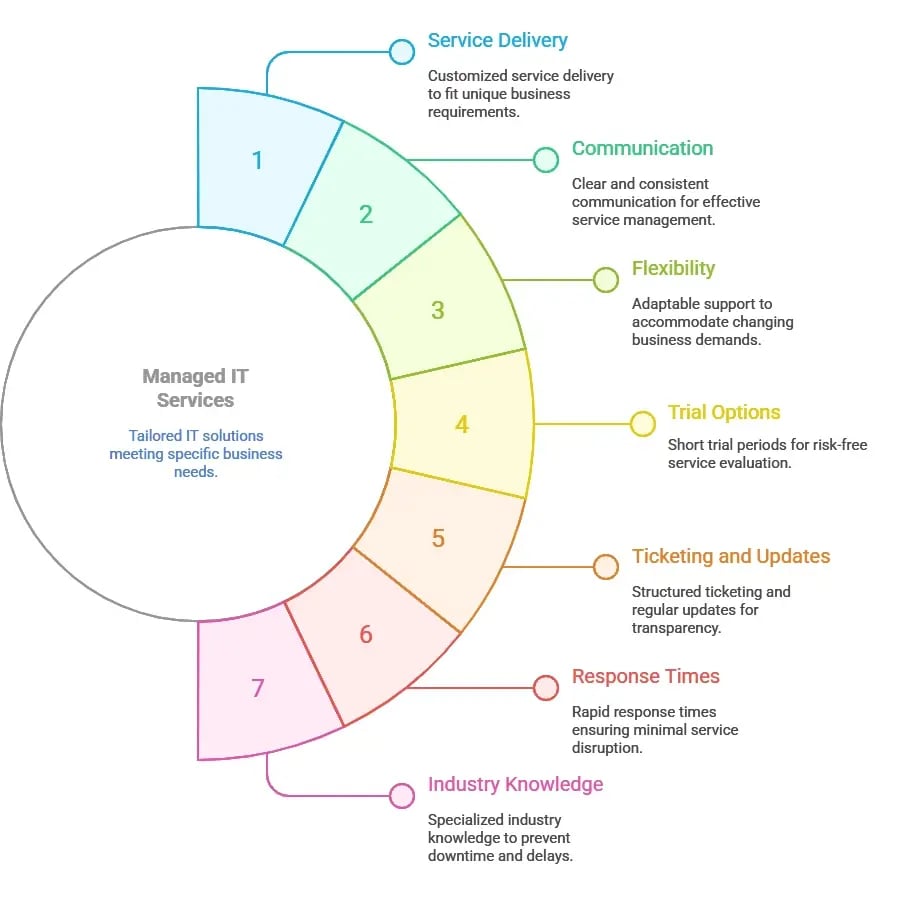When your business relies on technology, even small IT issues can lead to serious disruptions. Delayed updates, weak monitoring, and reactive support slow down your operations and increase costs.
According to ITIC’s 2024 Global Server Reliability Report, 93% of mid-sized and large businesses risk losing over $300,000 for every hour of unplanned downtime.
This makes it essential to move beyond one-off fixes and adopt the right types of managed services, the kind that prevent issues instead of reacting to them.
Jason Stitt, Co-Founder of IT Force, notes that “Many businesses think they need all the tools, but they just need the right ones that solve the right problems.”
This blog breaks down different types of managed services and how each one helps you work more reliably, reduce risks, and scale with confidence.
Don’t Wait for IT Problems to Sink Your Business!
Discover managed services that spot risks early and help your team stay productive.
Learn More
What Are Managed Services in Practical Terms
Managed services are ongoing support services that handle your IT systems. An external team that keeps your technology running smoothly provides these services. They monitor your network, solve problems, update systems, and provide assistance when needed.
This type of service is different from calling for help only when something breaks. Managed services are meant to prevent issues from happening in the first place. That means your systems stay secure, fast, and reliable.
Core Types of Managed IT Services Most Businesses Use
Most businesses rely on a few essential managed services. These services help reduce downtime, improve security, and make daily work easier. If your business uses technology for communication, storage, or operations, these services are worth exploring.
1. IT Support Services
IT support is the team you call when something goes wrong. It includes help desk support, issue tracking, and follow-up until the problem is fixed. This helps you avoid long waits or unclear updates.
What makes this service valuable:
- Ticketing systems: A structured ticketing process ensures every issue is tracked from the moment it's reported to the moment it's resolved. This gives you full visibility into what's happening and when to expect a fix.
- Phone and email support: Reliable phone and email support connects you to real people, not bots, when you need help. This reduces wait times and avoids the frustration of unclear updates.
- Issue documentation: Every support issue is logged and documented in detail. This helps your support team solve similar problems faster in the future.
If your business faces recurring tech issues or delayed assistance, this service can save time and frustration.
2. Network and Infrastructure Management
Your network includes everything that connects your devices, servers, internet routers, workstations, and more. If your network goes down or slows down, your team can’t work.
This service helps by:
- Performance monitoring: Around-the-clock monitoring keeps your systems running at full speed. It catches problems before they disrupt your team’s work.
- Automatic patching: Security patches and updates are applied without manual intervention. This helps reduce vulnerabilities and keeps your systems stable.
- Device tracking: All workstations, servers, and other hardware are tracked and logged. This ensures nothing is overlooked during maintenance or upgrades.
Businesses that rely on remote access, cloud storage, or connected tools require a network that runs smoothly always. This service helps prevent performance issues before they affect your work.
3. Cybersecurity Services
Cybersecurity systems uncover over 560,000 malicious software threats daily. Cybersecurity is no longer just for large businesses. Attacks can happen to anyone, especially companies with weak or outdated protections.
Good cybersecurity services protect your systems at many levels. These usually include:
- Email scanning: All incoming messages are scanned for malicious links and harmful attachments. This protects your team from phishing and other email-based threats.
- AI threat detection: Artificial intelligence tools monitor your systems for unusual activity. This helps identify risks before they cause real damage.
- Patch management: Known software vulnerabilities are fixed quickly through automated patching. This keeps your systems secure without waiting for manual updates.
- Microsoft 365 protection: Tools like OneDrive, SharePoint, and Teams are monitored for unauthorized access and suspicious behavior. This adds another layer of defense for remote and cloud-based work.
This layered approach makes it more difficult for threats to reach your data or disrupt your systems.
4. Cloud Services
Moving to the cloud gives you flexibility and scalability. But you must properly set up and maintain cloud systems to optimize value.
Cloud services help with:
- Cloud migrations: Moving to a cloud platform like Microsoft Azure is handled smoothly and securely. This ensures minimal downtime and disruption to your business.
- Performance reviews: Regular reviews help identify slow or costly cloud setups. This keeps your cloud environment efficient and cost-effective.
- Access control: Access is limited based on roles to protect sensitive information.
Many businesses waste money on unused cloud tools or face issues with remote access. These services help fix that.
5. Backup and Disaster Recovery
Losing access to your data, even for a short time, can stop your business. CloudSecureTech reports that 60% of small businesses shut down within six months of a major data loss.
This service protects your information through:
- Daily backups in multiple locations: Your data is backed up automatically each day and stored in more than one location. This keeps it safe even if one system fails.
- Regular backup testing: Backups are tested frequently to make sure they work when needed. You don’t have to worry about recovery failures during an emergency.
- Fast system recovery: In the event of a problem, systems can be restored quickly, sometimes in under 30 minutes. This reduces downtime and helps you stay productive.
This is especially useful for industries such as manufacturing, legal, and healthcare, where system downtime can result in lost work or failed audits.
|
More articles you might like:
|
Advanced Types of IT Managed Services That Improve Strategy
Once you’ve covered the basics, you can look at services that help improve planning, reduce waste, and align technology with your goals.
These services help you make better use of your IT investments.
1. vCIO and IT Consulting Services
A virtual Chief Information Officer (vCIO) gives you expert planning without the cost of a full-time executive. This service helps you build IT strategies that match your business goals.
Key benefits include:
- Quarterly IT reviews: Every few months, your IT systems are reviewed to make sure they still meet your needs. This helps keep your technology aligned with your business goals.
- Technology roadmaps: A clear IT roadmap outlines what tools, upgrades, and processes your business will need next. It helps you plan and avoid rushed decisions.
- Strategic guidance: You get practical advice on how to manage costs, improve performance, and reduce risk. This makes your IT spending more focused and effective.
This keeps your IT systems in sync with your growth plans, rather than working against them.
2. AI-Enhanced Services
AI is now a part of many high-performing IT systems. It helps speed up support, improve system monitoring, and block threats before they spread.
AI tools can automate:
- Cloud usage analysis: AI tools review how your cloud services are used day to day. This identifies unused tools or heavy usage that could be trimmed or optimized.
- Login behavior tracking: Login patterns are constantly analyzed to detect anything unusual. This helps stop security threats like stolen credentials before they spread.
- Proticket sorting: Support tickets are professionally categorized and sent to the right technician. This shortens response times and improves issue resolution.
These services add efficiency without adding complexity. They also reduce human error, especially in busy environments.
3. Compliance Management
If your business handles private or sensitive data, you need to follow compliance rules. These might include HIPAA, SOC 2, or ISO 27001. Staying compliant means documenting systems, managing access, and proving that you're following the rules.
This service supports compliance through:
- Ongoing documentation: Technical reports are archived to stay in compliance. This makes it easier to prepare for audits and reviews without last-minute stress.
- Policy monitoring: Systems are checked for violations of internal or external rules. This helps address issues early and stay ahead of compliance risks.
- Audit support reports: Detailed reports are created to help with regulatory audits or certifications. This removes guesswork and saves time during assessments.
Compliance services reduce legal risks and ensure you’re adhering to both internal and external standards.
What to Expect From a Managed IT Partner

Managed IT services work best when they’re built around your needs. That includes how the service is delivered, how communication happens, and how flexible the support is.
Some key features of a solid managed service setup include:
- Short-term trial options: Many providers offer free or low-cost trials with no long-term commitment. This lets you evaluate the service before making a decision.
- Structured communication: Clear updates are shared throughout every support interaction. This means you always know the status of your requests and what to expect next.
- Fast response times: Many providers aim for quick call and email responses, often within minutes. This ensures your issues are handled without delay.
- Industry-specific knowledge: Some providers work heavily in industries like manufacturing or logistics. This experience helps them understand and solve your business’s unique challenges.
Choosing a provider that learns your systems helps reduce support time and improve results over time.
Which Types of IT Managed Services Fit Your Business?
You don’t need every managed service. The key is to choose what solves your actual problems.
Here are some factors you should consider:
- Need for compliance: If your business handles sensitive data, you’ll need services that focus on security, documentation, and audits.
- Overloaded internal IT team: Offloading routine support or monitoring allows your in-house team to focus on strategic work that drives growth.
- Major business changes ahead: If you're scaling or changing your systems, a roadmap and planning support will help prevent confusion and downtime.
- Recurring system issues: If you face regular outages or slow performance, monitoring and AI-based services can detect and fix problems before they grow.
You can start small and expand later. The goal is to solve problems, not just add services.
Compare Types of Managed Services by Business Need
The table below outlines common business needs and the types of managed it services that help solve them. This helps match your challenges with useful solutions.
|
Business Need
|
Recommended Service(s)
|
|
Reduce Downtime
|
IT Support, Network Monitoring
|
|
Improve Cybersecurity
|
Cybersecurity Services, Compliance Management
|
|
Scale Cloud Operations
|
Cloud Services, AI Optimization
|
|
Meet Industry Regulations
|
Compliance Services, Backup & Disaster Recovery
|
|
Align IT to Business Goals
|
vCIO, Quarterly IT Roadmap
|
|
Simplify Vendor Management
|
Full-Service Managed IT Package
|
|
Enable Remote Workforce
|
Microsoft 365 Protection, Cloud-Based Backups
|
Use this table to find the most useful services for your business, not just the most popular ones.
Maximize Productivity with Different Types of Managed Services From IT Force
The right types of managed services can improve security, reduce downtime, and support long-term growth. With simple pricing, flexible support, and tested methods, these services give you more control without adding more work.
IT Force has delivered measurable results across industries with a 95% reduction in recurring IT issues within three months and an average response time under 10 minutes.
| Trusted Managed IT Services Near You |
| Burlington |
Mississauga |
Our experienced team supports over 800 users and continues to update strategies three times a year for maximum value.
Contact us today to explore our no-risk trial. Get support that matches your business, not just your tech.







